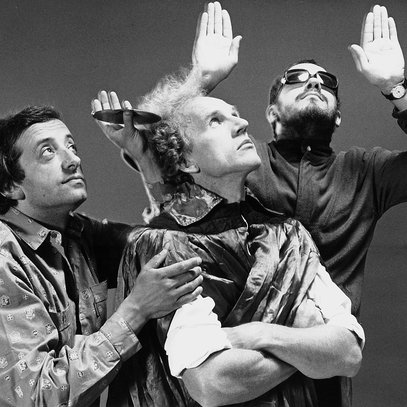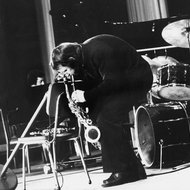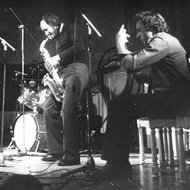Vyacheslav Ganelin, Vladimir Tarasov and Vladimir Chekasin Trio
Vyacheslav Ganelin, Vladimir Tarasov and Vladimir Chekasin are the three pillars of Lithuanian jazz. The whimsy of fate brought all three Russian-born musicians to Lithuania, where they united, in 1971, to form a trio which has earned the international acclaim for Lithuanian jazz. One cannot overestimate their impact on the following generations of Lithuanian jazz musicians; their brave stylistic interplays, large-scale suites, theatrical extravagance, irony and self-irony became trademarks of the whole Lithuanian jazz school.
Jūratė Kučinskaitė
Impression
Biography
The GTCh Trio (Vyacheslav Ganelin, Vladimir Tarasov, Vladimir Chekasin; active in 1971-87) has earned the international acclaim for Lithuanian jazz, was the driving force in the evolution of this genre in Lithuania, and has laid the foundations for the Vilnius jazz school.
The origins of the group can be traced back to 1969 when Ganelin and Tarasov together started working on the program Opus a 2 which was premiered in Gorky and Donetsk jazz festivals in 1970. The saxophone player from Sverdlovsk Vladimir Chekasin joined the duo in 1971. Since then the Trio has been presenting a new large program each year, affirming their ambition for groundbreaking artistic explorations. The first programs - Consilium, Postludium, Ad libitum, Ex libris - made a strong impression on jazz aficionados and were ardently discussed among critics and audiences.
In 1974 the Trio was one of the first jazz groups in the former Soviet Union to be granted the residence at the State Philharmonic Society, becoming the Contemporary Chamber Music Ensemble of the Lithuanian State Philharmonic Society. This offered the Trio more possibilities to participate in festivals in Soviet Union and abroad. The musicians from Lithuania were allowed (among a very few Soviet jazz groups) to tour in Eastern and Western Europe, later in Cuba, India and the USA; their recordings were released by Polish, German, Swiss, American and British companies.
The Trio's first program developed especially for studio recording, Con anima, was recorded in Vilnius Recording Studio in 1976. In the same year, Trio participated in Jazz Jamboree festival in Poland with the program Poco a poco, receiving the highest acclaim from critics and audiences alike. Polish press wrote: "The performance of the Soviet jazz trio was the biggest surprise. It proved that we have been waiting for this trio's performance for several years not in vain. The Contemporary Chamber Music Ensemble of the Lithuanian State Philharmonic Society is one of the most fascinating groups in Europe. They play intuitive music, free jazz, grounded in traditions." (Express Wieczorny, 1976.11.03)
A blend of different styles and musical cultures, new forms, multi-instrumentalism, disclaiming the dichotomy of soloist and accompanist - all such features made the Trio's music close to early free jazz and the Art Ensemble of Chicago, it was also often compared to the compositions of Anthony Braxton.
In a conversation with the jazz critic Aleksey Batashev, Ganelin said: "We listen to all kinds of music. Event the simplest polka tune could lend a needed rhythm pattern and sound. We can not do without classical music, traditional jazz, not to speak about modern jazz and other up-to-date issues of music world." (Jazz Forum, 1973 No.5)
The programs of the Trio Album for Young People, Catalogue, Home Music Making testify to their fascination with theatrical expression and visual effects which should heighten the impact of performed music. "The model of the classical theatre is of great importance to us. Sometimes our work could be called psychological instrumental theatre." (Jazz Forum, 1973 No.5)
The instrumentation of the Trio included about 20 different instruments. Ganelin played piano, synthesizers, guitar, drums and percussion; Tarasov used to equip himself with an array of drums and percussion instruments, sometimes would even blow different whistles or trumpet; Chekasin played flute, clarinets, saxophones (often two instruments at once), also violin. The musicians used advanced playing techniques, often supplemented the instrumentation with various "non-musical" objects; the percussion section was especially rich.
"Our music is polyphonic in that each of us approaches a musical idea individually. You feel when it is time to keep quiet, and when to enter. In a conversation partners feel each other. If one of us discovers an interesting idea the other two follow," said Ganelin. (Nemunas, 1978 No.8)
The second program recorded in Vilnius Recording Studio, Concerto grosso, has caused uproar in the management of Melodia company in Moscow - defying any avant-garde manifestations, the authorities were shocked by such radical musical concept. All divisions of Melodia were ordered to carefully watch the ideological and artistic aspects of recorded music. This recording was released only after three years.
At the late 70s and early 80s the Trio has toured intensively, receiving international acclaim. The German jazz critic Joachim Berendt claimed that the Trio plays "the most organised and the most professional free jazz, I have had chance to hear in many years." (Down Beat, 1980)
The Trio's work could be compared to contemporary art both in expression and general aesthetic principles. Their music is a unique artistic discovery, stemming from the musicians' versatile background, erudition, originality and mastership.
In 2017, the members of the Trio were awarded the Lithuanian National Arts and Culture Prize, the highest artistic distinction in Lithuania.
© Rūta Skudienė, Aušra Listavičiūtė, Olegas Sotnikovas
Tel: +370 699 28025
Trio Wiaczesława Ganielina
Pronit Z-SX0628, 1976 (LP)
Con anima
Vyacheslav Ganelin - p, synth, Vladimir Tarasov - dr, perc, Vladimir Chekasin - reeds
Melodija C60 07361 2, 1977 (LP)
Sonore Records SN 0014, 1995 (CD)
Leo Records GY 015, 2001 (CD)
Catalogue
Leo Records LR 102, 1980 (LP)
Leo Records CDLR 102, 1993 (CD)
Concerto grosso
Vyacheslav Ganelin - p, g, tb, perc, Vladimir Tarasov - dr, perc, tp, Vladimir Chekasin - reeds, v
Melodija C60 14433 4, 1981 (LP)
Sonore Records SN 0015, 1995 (CD)
Leo Records GY 015, 2001 (CD)
Con fuoco
Leo Records LR 106, 1981 (LP)
Ancora da capo
Leo Records LR 108-109, 1982 (LP)
Supraphon 1115 3014H, 1986 (LP)
Leo Records CDLR 108, 1997 (CD)
Poi seque
Vyacheslav Ganelin - p, synth, g, tp, fl, Vladimir Tarasov - dr, perc, fl, Vladimir Chekasin - saxes, tb, fl, perc, v
Melodija C60 17485 006, 1982 (LP)
East Wind Records 20647, 1986 (MC)
Sonore Records SN 0016, 1995 (CD)
Non troppo
Enja Records 4036, 1983 (LP)
Hat Hut Records 2027, 1985 (LP)
Leo Records CDLR 112, 1995 (CD)
New Wine...
Leo Records LR 112, 1983 (LP)
Leo Records CDLR 112, 1995 (CD)
VIDE
Leo Records LR 117, 1983 (LP)
Leo Records GY 413-416, 2003 (CD)
Semplice
Vyacheslav Ganelin - p, synth, hn, perc, Vladimir Tarasov - dr, perc, Vladimir Chekasin - as, tb, rec, perc
Melodija C60 21121 009, 1984 (LP)
Sonore Records SN 0018, 1995 (CD)
Strictly for Our Friends
Leo Records LR 120, 1984 (LP)
Leo Records GY 013, 2001 (CD)
Baltic Triangle
Leo Records LR 125, 1985 (LP)
Leo Records GY 413-416, 2003 (CD)
Con affetto
Leo Records LR 137, 1985 (LP)
Leo Records GY 002, 1999 (CD)
Ttaango... in Nickelsdorf
Leo Records LR 400-401, 1986 (LP)
Leo Records GY 018-019, 2002 (CD)
A Concert in Moscow
Trio GTCh + Mario Schiano - as
Free Records FR 00786, 1986 (LP)
Poco a poco
Leo Records CDLR 101, 1988 (CD)
Opuses
Trio GTCh + guests: Mika Markovich - dr, Victor Fonarev - b, Uri Abramowich - voc
Leo Records CDLR 171, 1990 (CD)
San Francisco Holidays
Trio GTCh + ROVA Saxophone Quartet
Leo Records CDLR 208-209, 1992 (CD)
Encores
Leo Records CDLR 106, 1994 (CD)
15-year Reunion: Live at Frankfurt Book Fair
Leo Records CDLR 375, 2003 (CD)
In compilations
Jazz Jamboree-76 (1)"Poco a poco" (fragment)
Muza SX-1454, 1977 (LP)
Tbilisi-78
"Ex libris" (fragment)
Melodija C60 14319 20, 1980 (LP)
Jazz Bühne Berlin-79
"Catalogue" (fragment)
Amiga 8 55 749, 1980 (LP)
Jazz-82 (2)
"Mack the Knife"
Vyacheslav Ganelin - p, ky, Vladimir Tarasov - dr, Vladimir Chekasin - as
Melodija C60 19123 006, 1983 (LP)
Autumn Rhythms-83 (1)
"Lento"
Melodija C60 21537 000, 1985 (LP)
Bratislava Jazz Days-85
"Non troppo" (fragment)
Opus OE 5011 3115-1810-11, 1986 (LP)
New Music from Russia: The '80s
"New Wine..." (fragment)
Vyacheslav Ganelin - synth, Vladimir Tarasov - dr, perc, Vladimir Chekasin - saxes
Leo Records CDLR 801-808, 1989 (CD)
Lithuanian Jazz 1929-1980
"Ex libris" / "Ad libitum" / "Poco a poco" / "Con anima" / "Live in Lithuanian State Philharmonic Hall" (all fragments) / "Who Is Afraid of Anthony Braxton" / "Umtza-Umtza"
Vyacheslav Ganelin - p, synth, perc, Vladimir Tarasov - dr, perc, Vladimir Chekasin - reeds, voice, perc
Semplice SECD011, 2003 (CD)
Free Spirits: Jazz from Lithuania 2005
"Impression" (fragment)
Vyacheslav Ganelin - p, synth, Vladimir Tarasov - dr, Vladimir Chekasin - saxes, whistles, voc
Lithuanian Music Information and Publishing Centre LMIPCCD 026, 2005 (CD)
Lithuanian Jazz 1980-1990
"Mack the Knife"
Vyacheslav Ganelin - p, ky, Vladimir Tarasov - dr, Vladimir Chekasin - as
Semplice SECD014, 2005 (CD)


